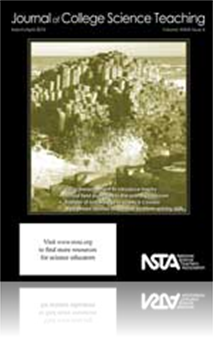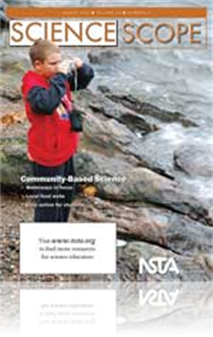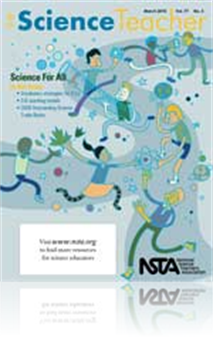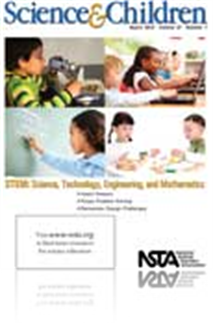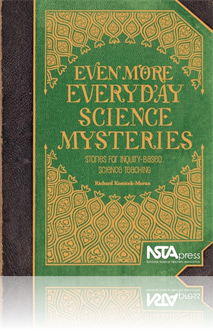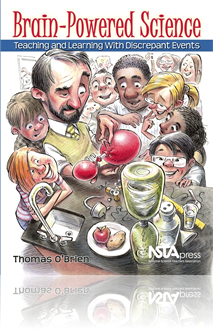All Resources
Journal Article
This study examined the nature of college students’ interest or lack of interest in science and the factors to which they attributed their interest or lack of interest....
Journal Article
Green Science: Investigating green—Creating surveys to answer questions
Being green means different things to different people. Some suggest that being green means saving energy, not wasting paper towels, going solar, harnessing wind, using less fertilizer, or buying products that are organically grown. Given that being ...
Journal Article
In 2007 and 2008, three science teachers participated in research “cruises” to the Juan de Fuca Ridge off the coast of Washington. This opportunity was made possible by a National Science Foundation (NSF) CAREER grant awarded to Daniela Di Iorio,...
Journal Article
Scope on Safety: Battery safety basics
Batteries commonly used in flashlights and other household devices produce hydrogen gas as a product of zinc electrode corrosion. The amount of gas produced is affected by the batteries’ design and charge rate. Dangerous levels of hydrogen gas can ...
Journal Article
Make Your Own Digital Thermometer!
In the hands-on, guided-inquiry lesson presented in this article, high school students create, calibrate, and apply an affordable scientific-grade instrument (Lapp and Cyrus 2000). In just four class periods, they build a homemade integrated circuit ...
Journal Article
Community-Based Inquiry Lessons
The National Science Education Standards suggest that students work as real scientists in the classroom (NRC 1996; 2000). To accomplish this task, the authors developed community-based inquiry lessons (CBILs) that provide students with the opportunit...
Journal Article
Science From the Pond Up: Using Measurement to Introduce Inquiry
The authors engaged nonscience majors enrolled in an integrated science course with a prototype activity designed to change their mindset from cookbook to inquiry science. This article describes the activity, the Warm Little Pond, which helped studen...
Journal Article
In 2009, we had the year of astronomy. Even President Obama hosted an astronomy night on the White House lawn. Your explorations of nature need not be limited to daylight hours—though it is important to point our when celestial objects like the Moo...
Journal Article
Trash Pie: Is Your School Serving?
In observation of Earth Day, third-grade students were invited to examine what they contribute to the landfill and learn new ways they could help protect the environment. In this lesson, students collected, evaluated, and displayed data comparing the...
Journal Article
Every Day Science Calendar: March 2010
This monthly feature contains facts and challenges for the science explorer....
Journal Article
Favorite Demonstration: Inquiry-Based Approach to Understanding Common Descent
In this inquiry-based activity, students catalog external and internal characteristics of four different classes of animals during dissection exercises. On the basis of their accumulated data, students compare and contrast the animals, devise a phylo...
Journal Article
Teaching Through Trade Books: Imaginative Inventions
Invention assists students in understanding the relationships between the individual subjects of STEM education (science, technology, engineering, and mathematics). The playful nature of this month’s trade books adds that additional spark of creati...
Journal Article
Insects are fascinating creatures—especially when you and your students get up close and personal with them! To that end, the authors facilitated an inquiry-based investigation with an emphasis on identification of the different types of insects fo...
Journal Article
Libros de Ciencias en Español (2009)
Bienvenido—Welcome to our yearly list of recently published Spanish or bilingual science texts. Although most of these titles are for grades K–2, Spanish-speaking scientists-to-be of all ages will find these selections both enjoyable and informat...
Journal Article
Allowing a student to “see” through touch what other students see through a microscope can be a challenging task. Therefore, author Joan Bradley created three-dimensional (3-D) models with one student’s visual impairment in mind. They are meant...
Journal Article
Editor’s Roundtable: National Lab Day—Community-based science at its best!
National Lab Day (NLD) was launched by President Obama on November 23, 2009, and is a collaboration of more than 200 education, science, and engineering organizations, including NSTA. Teachers can use the NLD network to develop ongoing collaborations...
Journal Article
How many of our students come to the classroom with little background knowledge about the world around them and how things work? To help students develop conceptual understanding and explore the design process, the author brought the NASA “Engineer...
Book Chapter
Many of your younger students do not believe that air around us has mass or weight, let alone exerts pressure on us and on everything around us. So, the idea that the atmosphere in which we walk actually has mass and can exert pressure on our world m...
Book Chapter
Analogies: Powerful Teaching-Learning Tools
In this activity, teachers explore how teaching shares some attributes with a variety of other occupations, students consider their respective roles as learners, and both consider the reciprocal, interactive nature of the teaching-learning partnershi...
Book Chapter
Talking Tapes: Beyond Hearing to Understanding
The need to combine fun, hands-on “play” with the mentally engaging, minds-on “work” of learning should be emphasized in professional development settings and in science methods courses. Teachers should emphasize frequently—in words that st...
Book Chapter
Super-Absorbent Polymers: Minds-On Learning and Brain "Growth"
Super-absorbent polymers (SAPs) absorb and retain water up to several hundred times their mass and increase in volume up to 600%. Unlike this prop, students’ brains do not grow/learn by passive absorption of received knowledge from the outside. Lea...
Book Chapter
Mental Puzzles, Memory, and Mnemonics: Seeking Patterns
Various mental puzzles and memory tasks can seem difficult until a heuristic or generalizable problem-solving technique is discovered or invented. A mnemonic (memory device) can help learners remember information. A heuristic or mnemonic can make an ...
Book Chapter
Sound Tube Toys: The Importance of Varying Stimuli
Sound is a form of energy created and transmitted as a vibration or mechanical wave that can vary in pitch (frequency) and volume (amplitude). Simple toys can be used to engage interest and to develop and assess the skills of scientific inquiry and t...
Book Chapter
Convection: Conceptual Change Teaching
Two bottles of different-colored water are placed vertically, one on top of the other with open ends together. They remain stable if the bottle with the hotter (red-colored) water is placed on top of the bottle with the cooler (blue-colored) water. I...
Book Chapter
Brain-Powered Lightbulb: Knowledge Transmission?
This activity explores the closed, battery-powered circuits that convert chemical potential energy to electrical energy to light energy. Since Edison’s invention of the lightbulb, it has been commonly used as a visual symbol of intelligence, ingenu...
Book Chapter
3D Magnetic Fields: Making Meaningful Connections
In this activity, a sealed, transparent container filled with a clear, colorless oil and several tablespoons of iron filings is shaken and a cylindrical magnet is suspended in the middle of the container. Beautiful magnetic field lines are made visua...
Book Chapter
Electric Generators: Connecting With Students
Most students have a very limited sense of where electricity comes from. In this activity, a hand-powered electric generator converts mechanical energy into direct current (DC) electricity that can be used to power a small lightbulb, run an electric ...
Book Chapter
Static Electricity: Charging Up Two-by-Four Teaching
Static electricity is created when two different insulating materials are rubbed together, creating friction that allows electrons to shift from one material to the other. In this activity, a 6-8 ft., 2 in. x 4 in. board balanced on a large watch gla...
Book Chapter
Möbius Strip: Connecting Teaching and Learning
A Möbius strip is a nonorientable, two-dimensional surface with only one side. The one-sided nature of the Möbius strip is an example of an emergent property—a property that is found in a system as a whole, but not in any part of the system. In t...
Book Chapter
Needle Through the Balloon: Skewering Misconceptions
Prior experiences and conceptions that students have about a wide variety of science phenomena (e.g., sharp needles pop balloons) often form barriers to developing more scientifically valid understandings. In this activity, a long needle is passed th...
Book Chapter
Happy and Sad Bouncing Balls: Student Diversity Matters
This activity features two seemingly identical black rubber balls—one happy and one sad—that behave quite differently. The two balls can be used to introduce the National Science Education Standards’ unifying concepts and processes and to rais...
Book Chapter
Electrical Circuits: Promoting Learning Communities
Direct current (DC) electricity flows through a closed circuit of people, and a battery-powered ball lights up. In this activity, the Energy Ball (or UFO Ball) is a Ping-Pong ball look-alike battery-powered ball that produces and converts a small cur...
Book Chapter
Eddy Currents: Learning Takes Time
A metal slug dropped into a copper tube falls under the pull of gravity and drops out at the bottom fairly quickly. When a second, apparently identical, slug is dropped into the tube, it falls quite slowly. If one slug is secretly held in the instruc...
Book Chapter
Cognitive Inertia: Seeking Conceptual Change
Cognitive inertia (or conservatism)—the tendency of humans to continue to think both what and how they have previously thought—applies at both the individual and the scientific community level. This activity features two demonstrations that can b...
Book Chapter
Optics and Mirrors: Challenging Learners' Illusions
Science depends on empirical evidence, logical argument, and skeptical review. Optical illusions challenge us to consider if our eyes sometimes play tricks on us. In this activity, coins dropped into a magic bank appear to shrink in size and fall thr...



